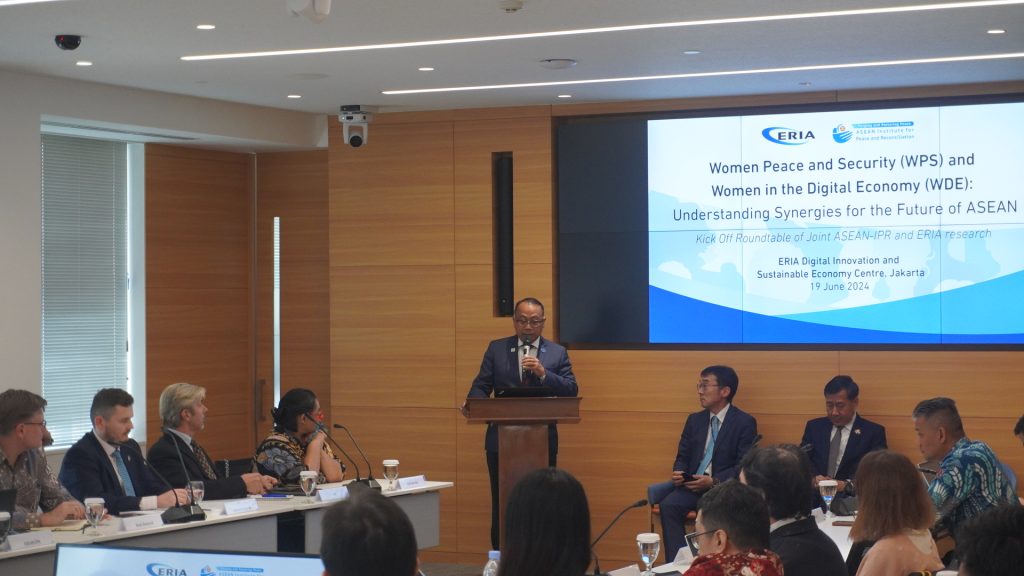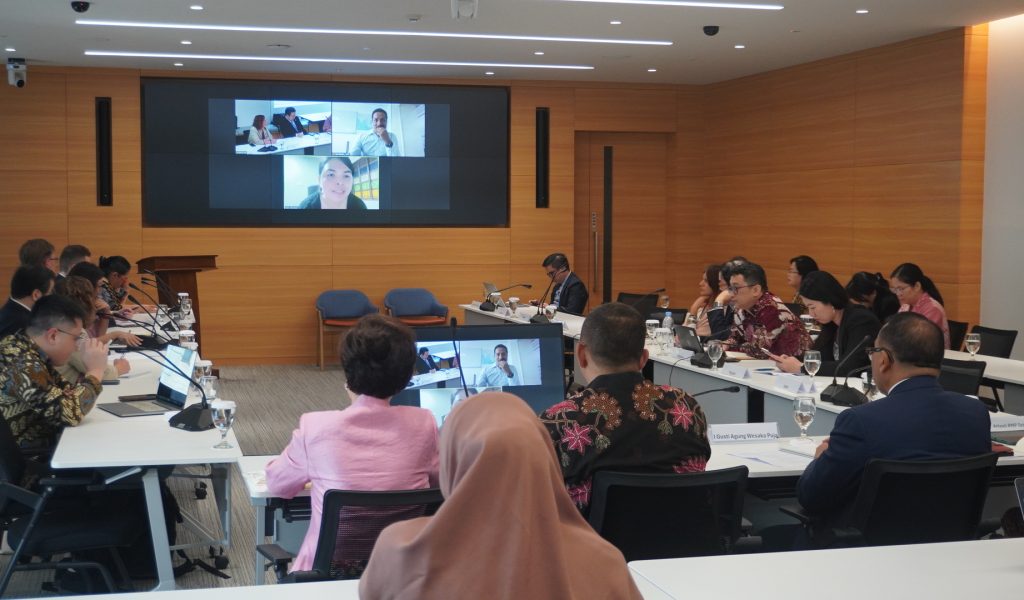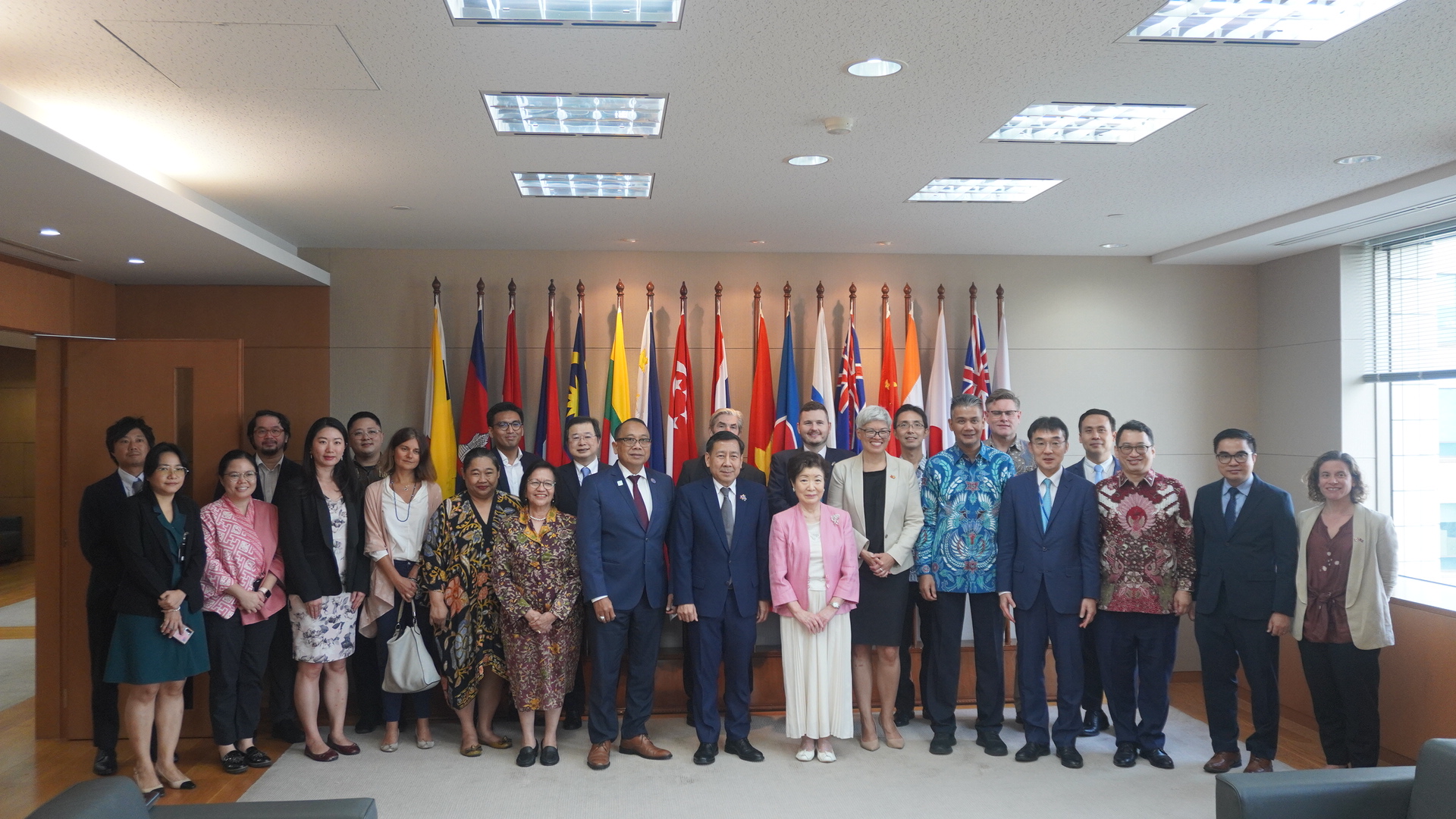Kick-Off Roundtable of Joint ASEAN-IPR & ERIA Research Women, Peace, and Security (WPS) and Women in the Digital Economy (WDE): Understanding Synergies for the Future of ASEAN
Wednesday, 19 June 2024
ERIA's Digital Innovation and Sustainable Economy Centre, Jakarta + Videoconference (Hybrid)
Twenty-two in-person participants in Jakarta, along with an additional ten online participants and observers, attended the Kick-Off Roundtable for a Joint Research conducted by the ASEAN Institute for Peace & Reconciliation (ASEAN-IPR) and the Economic Research Institute for ASEAN and East Asia (ERIA). The research, titled 'Women, Peace, and Security (WPS) and Women in the Digital Economy (WDE): Understanding Synergies for the Future of ASEAN', aims to explore the intersection of these crucial areas.
High-level participants included Indonesia's Minister and Deputy Minister of Women's Empowerment and Child Protection, Japan's Minister of Foreign Affairs, and Cambodia's Minister of Women Affairs, together with the President of ERIA, the Executive Director of ASEAN IPR, and the Chair of ASEAN IPR Governing Council. Other participants consisted of senior representatives from ASEAN Member States, ASEAN partners, ERIA's member countries' representatives, and like-minded institutions.
The partnership between ASEAN-IPR and ERIA's newly established centre on the digital economy aims to study the synergies between women's economic empowerment, the fast-growing digital economy in ASEAN, and recovery/rehabilitation to sustain peace and welfare in post-conflict areas. The study aims to provide data and analysis to support the mainstreaming of the WPS Agenda, particularly under the relief & recovery pillar, into the economic sector. It seeks to provide data on women's empowerment and its direct contribution to sustainable peace and prosperity, focusing on the experiences within ASEAN Member States. The study will examine enabling factors brought by digital technologies, as well as challenges such as misinformation, disinformation, and cyber violence against women and girls.
A networking lunch preceded the event. The Roundtable was opened by the President of ERIA, the Minister of Foreign Affairs of Japan, the Minister of Women Empowerment and Child Protection of Indonesia, the Chair of the ASEAN-IPR Governing Council, and the Executive Director of ASEAN-IPR.
In his Opening Remarks, Prof. Tetsuya Watanabe, President of ERIA, underlined the significance of this research project, which aims to connect the dots between women's inclusion and economic empowerment, and the vital role that women's groups play in achieving lasting peace, harmony, reconciliation, and prosperity in our societies. He highlighted how this project is developed under ERIA's new Digital Innovation and Sustainable Economy Center, whose mandate is the promotion and development of inclusive digital economies in the region.
H.E. Kamikawa Yoko, Japan's Minister of Foreign Affairs, highlighted that studies have shown societies with robust stability are less likely to experience violence and conflict, while societies that successfully implement gender equality often see increased economic growth rates. She expressed hope that the joint study could bring comprehensive understanding and insight for stakeholders on the intersection between the WPS Agenda and the Digital Economy Agenda. As Chair of ASEAN Ministerial Meeting on Women, H.E. Bintang Puspayoga (Indonesia's Minister of Women Empowerment and Child Protection) emphasised that the WPS Agenda has been high on the AMMW's priority list, acknowledging how women's participation in peace processes leads to sustainable outcomes.

As Chair of the ASEAN-IPR Governing Council, H.E. Bovonethat Douangchak, outlined Lao PDR's priorities as ASEAN Chair in 2024 with the theme 'ASEAN: Enhancing Connectivity and Resilience,' one of its nine priorities under women and children being 'promoting the role of women and children towards transforming behaviorism in ASEAN.' This aligns with the ASEAN Leaders' call to improve access to opportunities for women while responding to emerging challenges due to rapid technological development corresponding to the fourth industrial revolution and digital transformation. Lastly, Mr. I Gusti Agung Wesaka Puja, Executive Director of ASEAN-IPR, underscored that one powerful tool to elevate women's economic status and achieve lasting peace is technology. Thus, the study shepherded by ASEAN-IPR and ERIA aims to delve deeper into how women's economic potential could be maximised through their active participation in the digital economy, thereby fostering sustainable peace.
The first Keynote was delivered by H.E. Indra Gunawan, Acting Deputy Minister for Community Participation, Ministry of Women's Empowerment and Child Protection of Indonesia (who is also the Focal Point for the ASEAN Committee on Women (ACW)). He highlighted that integrating the digital economy into the WPS agenda significantly enhances women's empowerment by amplifying their voices and advocacy efforts. Achieving this goal requires collaborative efforts amongst stakeholders and supportive policies, recognising women as the backbone and innovators of our economy.
A second Keynote from H.E. Ing Kantha Phavi, Minister of Women Affairs of Cambodia, underscored the importance of not leaving women behind as the region moves gradually into the digital age. Therefore, digital infrastructure and literacy should be investment priorities for all ASEAN Member States' governments. Equally pertinent is an enabling environment for digital infrastructure and literacy, where women can feel safe and protected.
The Roundtable consisted of two Sessions - the first focusing on WPS in ASEAN, and the second zooming in on Women in the Digital Economy in ASEAN.
The first Session was chaired by Ms. Kartika Wijayanti (Project Management Officer of ASEAN-IPR) and featured Ms. Shebana Alqaseer (Consultant under the Office of MP Anna Tarhata Basman) and Mr. Bal Bahadur Bhujel (Regional Micro Economic Initiatives Advisor, ICRC) as speakers. This session aimed to see how the Women, Peace & Security (WPS) Agenda, particularly under relief and recovery, could feed into the study. Notable discussions highlighted the pivotal role of women in conflict and post-conflict situations, particularly in leveraging economic activities and promoting inclusive development. Lessons learned from the Bangsamoro Autonomous Region in Muslim Mindanao (BARMM) were showcased as a successful integration of WPS and WDE to uplift women and society as a whole.

The second Session was chaired by Dr. Giulia Ajmone Marsan (Head of Startups and Inclusion of ERIA) and featured Prof. Lauren Power (Co-Chair, Women in STEM Working Group W20, Advisor W7) as a speaker. This session underlined the persistent gender disparity in digital economy participation across various regions and between urban and rural areas, highlighting the critical need for gender-disaggregated data to bridge this gap. The enabling role of digital technologies for innovation and entrepreneurship was mentioned, as well as the risks brought by cyber violence, cyberbullying, and misinformation and disinformation against women and girls. Throughout the discussion, speakers and participants acknowledged the importance and timeliness of this research project in addressing these challenges.
Moving forward, the study will strive to integrate the economic perspective into the Women, Peace, and Security agenda. At the close of the event, Prof. Akiko Yamanaka (Special Advisor to the President of ERIA, former Vice Minister of Foreign Affairs of Japan) emphasised that this project is still a 'newborn' and needs support and synergies from all relevant stakeholders. She further expressed that the fusion between WPS and WDE brings key elements to creating a more peaceful and happier society.
For further information on the study and activities of ASEAN-IPR and ERIA, visit our respective websites and follow us on social media.




